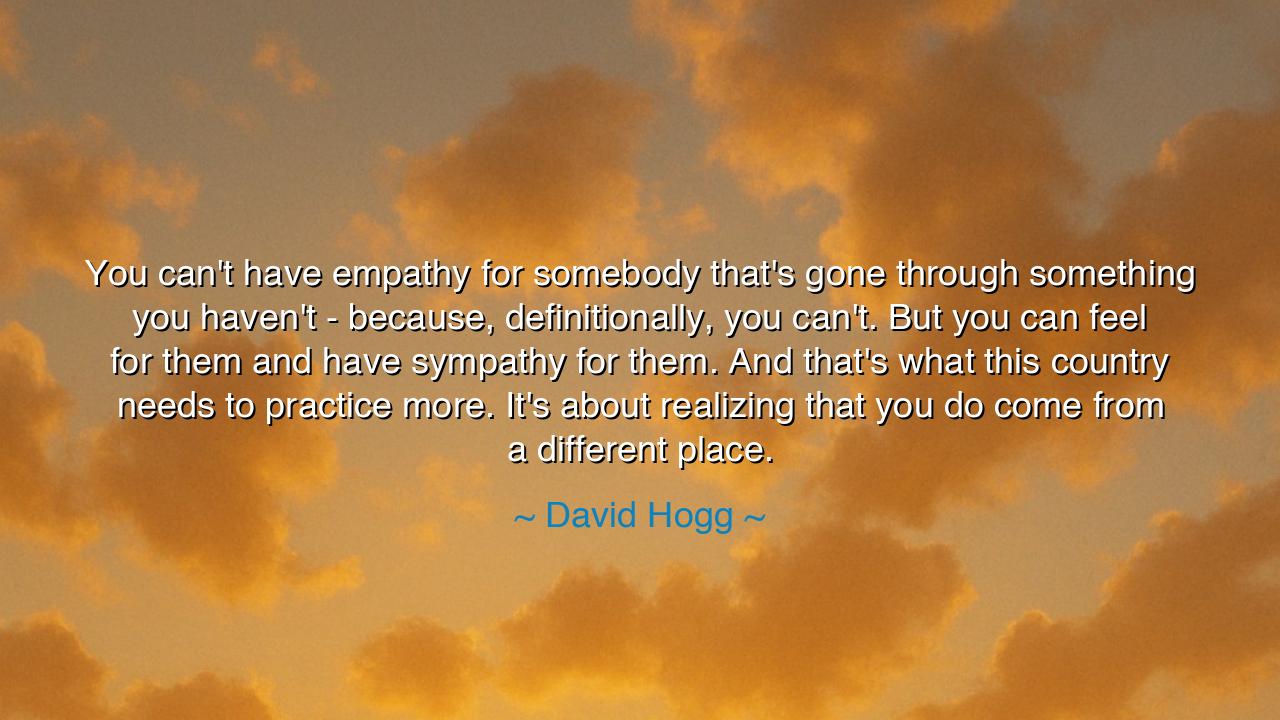
You can't have empathy for somebody that's gone through
You can't have empathy for somebody that's gone through something you haven't - because, definitionally, you can't. But you can feel for them and have sympathy for them. And that's what this country needs to practice more. It's about realizing that you do come from a different place.






Hear the words of David Hogg, a young voice forged in tragedy, who declared: “You can’t have empathy for somebody that’s gone through something you haven’t—because, definitionally, you can’t. But you can feel for them and have sympathy for them. And that’s what this country needs to practice more. It’s about realizing that you do come from a different place.” In this statement lies the wisdom of honesty and humility. He does not exalt false unity, nor pretend that suffering can always be understood; instead, he calls us to recognize our distance, and yet to bridge it with sympathy and care.
When Hogg speaks of empathy, he reminds us that to truly walk in another’s shoes, we must first have trod a similar path. One who has never lost a child cannot fully know the grief of one who has; one who has never starved cannot fully grasp the despair of hunger. To claim otherwise is to diminish the uniqueness of another’s suffering. Yet he does not leave us in separation. Instead, he points to sympathy—the power to acknowledge, to honor, and to feel for another even when their pain is beyond our comprehension. In this, he urges us toward humility: to admit, “I do not know your pain as you do, but I stand with you.”
The origin of these words comes from the crucible of violence, for Hogg survived the Parkland school shooting and thereafter dedicated himself to speaking for change. He knows that the pain of survivors cannot be fully shared by those who were not there. Yet rather than closing the door of understanding, he opens another: the practice of sympathy, the act of recognizing difference while still building solidarity. It is a call to a nation divided, urging it to learn not the arrogance of false sameness, but the humility of compassionate difference.
History confirms the power of such recognition. In the aftermath of the Holocaust, survivors often spoke of the impossibility of true empathy from outsiders. “You were not there,” they said, for no imagination could replicate the camps. Yet nations across the world responded not by claiming identical understanding, but through sympathy—through memorials, education, and remembrance. That sympathy did not erase the distance, but it honored it, and from honoring came the strength to ensure “never again.”
The deeper meaning is this: our differences of experience need not divide us, so long as we admit them and choose sympathy. The illusion that we must fully understand each other in order to care breeds disappointment. But when we admit the limits of our understanding, and yet choose to act in solidarity, we build stronger bonds. For sympathy requires not identical pain, but willingness to see the other as human, to acknowledge their truth, and to honor their struggle.
Beloved listener, take this into your life. Do not claim empathy where you have none, lest you wound by pretending to know what you cannot. Instead, cultivate sympathy. When a friend suffers loss you have never endured, do not say, “I know how you feel,” but rather, “I see your pain, and I am here.” When neighbors live in hardships foreign to you, do not dismiss them because they are not yours—stand with them, acknowledging that your place is different, but your compassion is real.
Therefore, let us as a people learn the art of sympathy. Let us not be paralyzed by difference, nor silenced by unfamiliarity, but let us reach out across divides, admitting what we cannot know, while still offering what we can: presence, care, advocacy, and love. For as Hogg teaches, the healing of a nation will not come from pretending we all feel the same, but from practicing sympathy across the lines of difference.
Thus his words endure as both warning and call: that empathy may be limited, but sympathy is boundless, if only we choose to practice it. And in this choice lies the path to unity, to justice, and to the rebuilding of a broken world.






AAdministratorAdministrator
Welcome, honored guests. Please leave a comment, we will respond soon